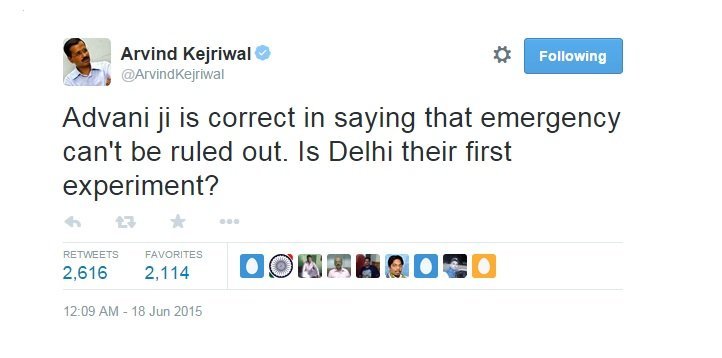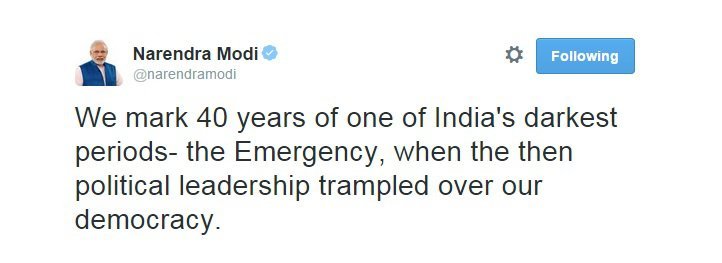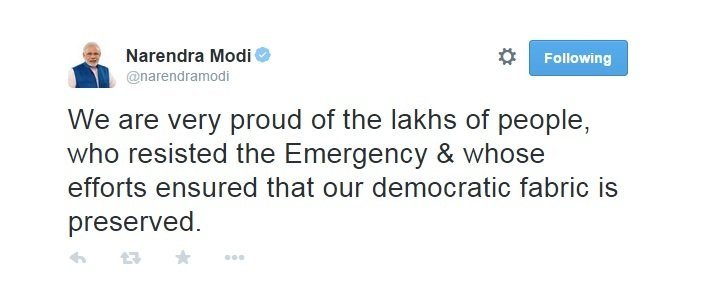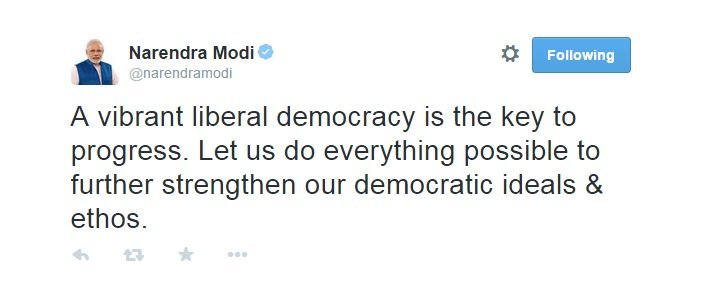Senior BJP leader L. K. Advani knows how to get everyone’s attention. On Jun 18, 2015, as he got into conversation with the Indian Express, this is what he had to say: “I do not say that the political leadership is not mature. But I don’t have the confidence that it (Emergency) cannot happen again.” Firstly, full points to the man for perfect use of double negation not once, but twice in a single quote.
That Advani has been miffed with internal party politics for a while now is no secret. Any octogenarian, especially one with a similarly massive political appetite and ambition would probably feel the same, and perhaps be right in doing so. The man, however, is largely one of a kind, and his words being of national consequence, need to be analyzed.
Emergency results from a danger or threat of danger declared by Governmental authority.
By definition, a state of emergency ‘results from a danger or threat of danger to a nation from foreign or domestic sources, and is usually declared to be in existence by Governmental authority.’ That being said, India has seen ‘emergency’ situations thrice in the past; twice during wars with China and Pakistan respectively, and once owing to ‘internal disturbances’. This last national emergency lasted for 21 months since June 1975, and is often considered among the darkest periods of modern Indian history.
The first consequence … Government’s unquestionable total bypass of the constitution.
The national emergency of 1975 followed from India barely wrapping up a gruesome and financially wrecking war with Pakistan. This was also an extended era of regional infighting and persistent oil crises. The first consequence of the emergency was the Government’s unquestionable total bypass of the constitution and its aspirations. This effectively meant that the country ran on mandates based purely on the decisions of a handful of leaders.
Emergency earlier led to the forced sterilization of lakhs of men and even more women.
Decisions that included the ability to suspend human and civil rights nationally, the Government’s unquestioned seizure of private property, the prime minister being above the purview of courts of law, and a nationwide censorship on all media. It also led to the unlawful imprisonment of thousands of politicians and journalists and the forced sterilization of lakhs of men and even more women. One small positive that did come out though, was that governmental and non-governmental offices and services were said to have worked diligently and promptly during the period.
That was 1975. A time very different from India now. Today, 40 years later, intentionally or otherwise, the country is more connected to the world and to itself. If this is an effect of globalization, technological boom, or any which reason is difficult to pinpoint, and in this situation, is inconsequential. These 40 years have had India embark on an evolutionary journey of development, financially, economically, and in terms of lifestyle improvements nationally, we have come such a long way! That this growth has been concentrated in certain pockets is no secret, but that’s sadly how growth has happened here.
Not surprisingly then, the comment raised a lot of interest in the political arena. The first reaction came from Delhi Chief Minister Arvind Kejriwal, via Twitter.

“When he [Mr. Advani] set forth his fear of a recurrence of an Emergency again, he is definitely pointing at somebody.”
Another strong remark coming, this time from a party that has been an ally with the BJP for the longest time. Should we read this “definitely” as a surety of things to come? Should we read this “somebody” as someone very real and capable of taking such a step? Is national emergency a real possibility? No one really knows.
You don’t have to be a genius … the repercussions of emergency are all-affecting.
Now, invariably, most of the media puts the onus on who is being pointed at. Maybe it matters to a certain point. But you don’t really have to be a genius to know that the repercussions of emergency are all-affecting, and it may raise questions regarding the population at large. We should be concerned about this. The entire electoral process and the faith people put in a democratic system, what is that really worth then?
This being the 40th anniversary of the National Emergency, PM Narendra Modi tweeted about his own experiences during the emergency, and also reassuringly, spoke of how the fabric of Indian democracy is for all to safeguard.



It’s difficult to imagine an India that would be alright with a national emergency situation. It’s scarier to think that we are still stuck with the same kind of problems that could render our constitution pretty much powerless once again. Also, it is extremely disheartening that a politician of the stature of Mr L.K. Advani can make such a politically prim statement about his own party, especially where he speaks about their “maturity” or lack of it. This is the ruling party he is talking about, and one that has more than a billion citizens to be responsible towards.
Unfortunately for all of us then, when possibly the longest serving statesman puts out a bleak future for the rest of the country, no matter the degree of possibility or not, it just doesn’t feel right. Or good.

















